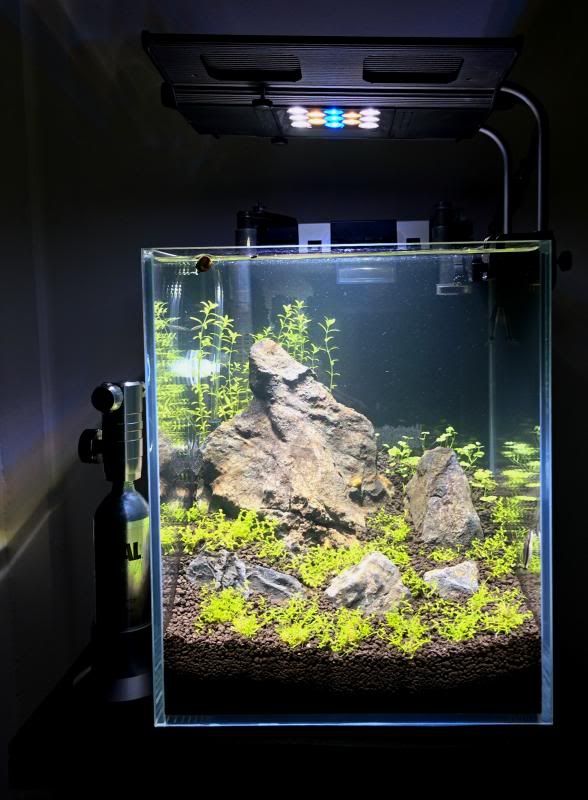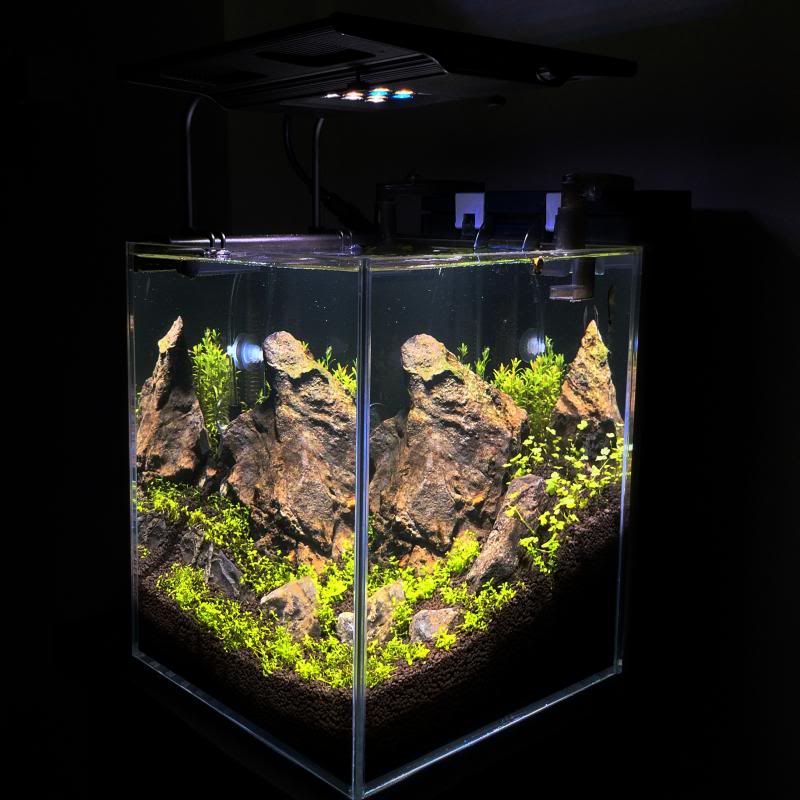Wow..must have cost you a bomb. Wondering whether good for a 40cm cube. Mind sharing the price?





Anyone using this wonderful LED light here?
I'm currently using it on my 20L nano planted tank. Previously was using a 9W LED for 2 weeks on a new setup, but apparently what was enough for hair grass, wasn't enough this time in this new scape comprising of Micranthemum 'Monte Carlo', Rotala rotundifolia and Hydrocotyle tripartita.
The 'Monte Carlo', which was supposed to be carpeting, instead grew vertically with very small leaves, while the inter node distance of the rotundifolia was big. Of course, no pearling whatsoever.
Thus, I decided to take the plunge and replaced that 9W with the Maxspect razor nano, and from the word go, it had been amazing. The rotundifolia is turning reddish on top, and oxygen pearling occur as soon as 20 mins after the lights were turned on.
Currently, the lights are suspended about 13cm above the water surface, adequately illuminating my tank surface of 25cm by 25cm, with the deepest point of the substrate at around 23cm and the shallowest substrate at 15cm.
As for the lighting intensity and timing, see below for the 6 point lighting value for both channels A and B:
T1: 1530 hrs A:0% B:0%
T2-T5: 1630-2300 hrs A:85% B:90%
T6: 2330hrs A:0% B:0%
Anyone who had the experience with this LED fixture would like to comment on my lighting duration and intensity?
I'm also concern if there will be potentially any algae problem that may arise, so far I'm performing a 50% water change every 2-3 days, with very light livestock inside there (5 Malayan shrimps, 1 Ottocinclus and 2 Indostomus paradoxus). Will add fishes when the tank is more stable.
I'm using ADA Amazonia soil, with 90ppm of CO2 (pH6.5, KH 4)
Here's my setup on the first day of its deployment:

Wow..must have cost you a bomb. Wondering whether good for a 40cm cube. Mind sharing the price?
Price should be around $400.

Wow,Maxspect razor nano
As long you maintain high co2 and fert in conjunction with your high light, it should be good enough. Keep due diligence your current wc interval also benefit most.
However this may difficult for your fauna in future, it's not impossible, it's just narrow down your balance equilibrium territory.
Good stuff you have
Sent from my iPhone using Tapatalk





Yeah, the light fixture is around $400.
Yup milk_vanilla, I think I've just made life a little bit more challenging for myself....I'd love to have a little algae on the rocks but not anywhere else.
Here's a pic of the tripartite pearling, you can also see how battered the old leaves were with inadequate light:
The Rotala rotundifolia had another trim and the shoots replanted. The red tinge on the tips is finally showing after only 4 days of setting up the light:
As for the foreground M. 'Monte carlo', I've razed them down short, hoping for the new shoots to grow horizontally instead of upwards.
90ppm of CO2?
Good to bump up the CO2 and Nutrient dosage with high lights to prevent algae from kicking in.





That's from my estimate by taking the pH and kH of the water, it should be close to that value, as my CO2 is on 24/7.
I'm currently using the Borneo Wild range of liquid fertiliser and yup, fertilisation has to keep up with CO2 and light to prevent algae, although I really don't mind some on the porous rocks though, which I'm sure will occur in time to come.
You can't calculate the Co2 ppm by directly measuring the pH and kH of your tank water when you are using ADA aquasoil... the soil itself is buffering the pH and kH so the numbers you get are not representative of the actual Co2 levels.
You need to use a Co2 drop checker which uses indicator solution mixed with neutral 4dkH reference solution (get the pre-mixed solutions, easier to use), that will show the measurements in Co2 ppm based on the non-buffered indicator solution environment within the drop checker.





Perhaps you could consider just getting a simple plastic internal drop checker like from the ISTA or Ocean Free brands, commonly sold at most LFS... at least can just to put into the tank for a while and get an idea of the Co2 levels.
Since you already have fishes and shrimps in the tank and you are running your Co2 system 24/7 without a solenoid regulator, it would be safer to have a drop checker so that you can observe the changes in Co2 levels. Co2 levels can accumulate over a period time so while the levels might be okay now, without a drop checker, as days go by the Co2 could slowly climb higher to unsafe levels without you knowing.
I've ever seen my drop checkers slowly drift from green to bright yellow over the course of just a week even though there was no change in daily solenoid timer schedule or bps, that helped me to further fine-tune the Co2 injection to a rate which maintained it at a safer level for the fauna over the longer term and thus avoided potential future disasters.
For aesthetics, you could also look at using external drop checkers instead, those just hang on the side of the tank and work well too, and they don't take up space in the tank.
Last edited by Urban Aquaria; 9th Feb 2014 at 02:35.





Roger that. Gonna take out my Gush CO2 drop checker and hang...
I've used this light on a 30x30x35cm "cube" as well as a 45x27x30cm tank. On both tanks, I've got HC and M. sp "Mote Carlo" to carpet well. I think the problem you have is that you have way too much light. On both my tanks, I kept the max light at 40-60%, depending on how much CO2 I was pumping in. I was using EI dosing regime for ferts. In your case, the high amount of lights is likely to be causing either CO2 or fertilizer deficiency, causing your plants to be growing poorly. My drop checker was kept between grass green and lime green - takes a few days for you to fine tune it to get the right long term levels, as pointed out by Urban Aquaria above. Instead of doing a "hit and miss" estimation for your ferts, why not try EI method? It is very cost efficient especially for a small sized tank like yours. I spent under $40 ordering ferts from a hydroponics store (inclusive of delivery to doorstep), and the amount of ferts I made can last a nano that size for over 10 years!





Hi illuminae,
Yup, I think it is good to get the drop checker going instead of a blind titration.
Yeah, i know the light intensity is a bit of the high side, but so is my CO2 running at 3 bubbles per second and using a super efficient diffuser, and also upping my fertilising regime up to two times the recommended dosage, and slowly titrating looking at plant growth and biomass.
The 'monte Carlo' was stringy and growing vertically prior to changing to this lighting, and the rotundifolia was tall and the intermodal distance was wide.
6 days after razing down the tall 'monte Carlo'and using this light, they are throwing much bigger leaves and going horizontally now, while the tips of the rotundifolia shoots are turning red and the growth is bushier.
I know it can't go on like that, so once everything stabilises, I'll slowly titrate downwards my fertilisation and light intensity. The only caveat to such a high intensity is that I've got to perform large water change every other day....
Yeah, for a start, I'll set up my drop checker.
Be very careful at such high light intensities. If you're going such high light and CO2, go with EI for a measure of safety. I don't know what ferts you use, but to be honest, recommended dosage on most fert bottles is trash. Many commercial fertilizers omit key nutrients, or mix their ferts at wrong proportions, thus potentially causing a deficiency. Such deficiency will be magnified in a tank like yours where everything is growing at such a high speed. It's really much easier to just "go slow" imo, especially given that your plants are fast growers even in a "slow" environment anyway. My 'Monte Carlo' carpeted the entire 45cm tank in under 2 weeks at 40% light intensity and 2bps using UP inline diffuser. Not sure about Rotala rotundifolia, but my Rotala wallichii needed to be trimmed weekly as they reach the surface that fast.





Haha, you are right, those recommended dose just doesn't take into account the type of plants and their biomass! I usually use them as my baseline and work upwards.
Sigh, my montecarlo had suffered much in the first two weeks of setup with the insufficient light, they came out the worst, growing upwards with very tiny translucent leaves. Now, the new leaves are a lot bigger but some of them are still growing upwards, so I guess I'd have to raze again and teach them how to carpet. The tripartita is going crazy at the moment though.
I know I'm walking on a tight rope here, going on a high intensity programme. About EI, I just find it abit too tedious for an old dog like me to learn new tricks, go buy and calculate the ppms. Besides, I'm really short of time once I start working next week. I've done high intensity tanks before with hardly any algae blooms, titrating the ferts, CO2 and light by looking at the growth and health of the plants. Once I get the desired look of the tank, I usually will start bringing everything downwards.
Below is the tank taken 2 days ago:

Last edited by hobbit6003; 11th Feb 2014 at 11:47.
do you think these rocks would leak any minerals?





That 3 blue LED light would do more harm then benefit, freshwater algae loves them.
MISSION ACCOMPLISHED!!! TIME TO LAY BACK AND RELAX!
A Journey Of A Thousand Miles Begins With A Single Step





Haha, I don't know about that, but today, as I observe those week old leaves of the 'monte carlo' and the H. tripartita, they are all looking burnt or scorched, so i reckon that I better turn down the lights.
I've just adjusted to around 65-75%, and will observe further.
Thanks guys, especially Urban Aquaria and illuminae for your advise, my drop checker suggested a light green tending towards yellow, will continue to adjust ferts as well.
Bookmarks